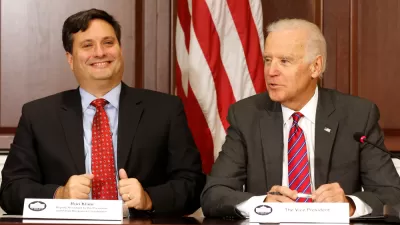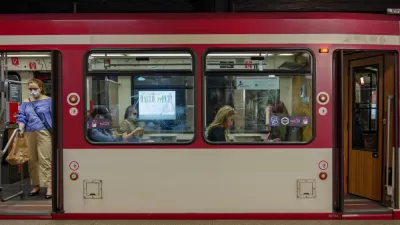Any leader is only as good as their team, and supporting your team's work while earning their trust and respect is the number one responsibility of a good leader. Here are six additional thoughts on what makes a good municipal leader.
In late September, the Council for Canadian Urbanism (or CanU), which I’ve been the President of since our official creation in 2009, will be holding our 5th annual Summit of leading Canadian multi-disciplinary urbanists, #CanU5, in Halifax, Nova Scotia. This year's theme is city-building leadership, particularly within our city halls, and in the urbanism professions and practice in general. To support the leadership dialogue, one of our keynotes will be a panel discussion with the Chief Planners for Montreal, Toronto and Calgary.
It's a topic of particular interest to me, as a former municipal leader, and now as an advisor to cities on city-making as well as leadership, culture change and capacity-building.
I’ve had the benefit of some truly excellent leadership mentors in city halls, and I’ve also had a boss or two that have been powerful illustrations of what not to do. The good ones instilled in me the wiring that municipal leadership is about inspiring and empowering excellence and creativity, earning and keeping trust, nurturing talent, recognizing and rewarding both successes and “competent failures” (as my friend Charles Landry calls them), and cultivating a culture of intelligent risk-taking. If you truly care about the people on your team - their growth, success, satisfaction and pride - that's more than half the battle.
As coincidence would have it, a few months back during some Sunday filing, I happened across an old file of handwritten notes that I had long forgotten about. They were from a series of candid lunch chats I’d had in the year 2000, after accepting my first municipal management position with the City of Calgary. I was nervous about making the transition to the public sector, and was lucky enough to have the benefit of good relationships with a handful of Chief Planners from a variety of Ontario municipalities. They shared with me their advice on municipal leadership as I made the jump to my first city hall.
Reading the notes again now, after 12 years of municipal leadership, was eye-opening, and in a way, validating. I hadn't specifically remembered much of these conversations, except for the most important advice that every chief planner gave me, that has stayed with me ever since – “always support your people.” Any leader is only as good as their team, and supporting your team's work while earning their trust and respect is the number one responsibility of a good leader.
Aside from this key message, some additional thoughts jumped off of the handwritten pages. I initially shared them through a series of six 140-character tweets that generated some interesting twitter discussion a few months back, and several urbanists encouraged me at the time to assemble them into an article, which you are now reading. So here they are, in the same 140 character-max form in which I originally tweeted them:
- Leaders are there to support their people, their staff. Not the other way around. It's about your team's success. Put your people first.
- Leaders deal with 50+ issues a day, roughly 3.5 minutes per issue. Teach & empower your people to make decisions & build their capacity.
- Don't micromanage. Strategically lead, & make sure your people know what you need to be informed on, & what they can handle themselves.
- Create a culture & environment that motivates & inspires, where people are safe making mistakes. Listen, respect, never push them down.
- Be clear about your expectations, be consistent, & never blindside your people. Don't make them second-guess or feel nervous about you.
- Great leaders aren't afraid to surround themselves with people who are smarter than they are, & especially that fill their blind spots.
Simple, right? In fact, these 6 can be surprisingly challenging to put into practice. There was much more in the text and sub-text of the handwritten notes, and I’ve since read and lived much more on the subject of creating a culture of success and innovation, but it occurs to me that we often over-complicate things when it comes to good leadership. Twelve years later, I realize these 6 pieces of advice have served me well, and confirmed my own feelings and instincts regarding leadership.
I hope to see you at our #CanU5 Summit in Halifax, for much more dialogue on how we all can provide better and stronger leadership in our city halls, our practices, and in our building of Canadian cities, towns and communities.

Manufactured Crisis: Losing the Nation’s Largest Source of Unsubsidized Affordable Housing
Manufactured housing communities have long been an affordable housing option for millions of people living in the U.S., but that affordability is disappearing rapidly. How did we get here?

Americans May Be Stuck — But Why?
Americans are moving a lot less than they once did, and that is a problem. While Yoni Applebaum, in his highly-publicized article Stuck, gets the reasons badly wrong, it's still important to ask: why are we moving so much less than before?

Using Old Oil and Gas Wells for Green Energy Storage
Penn State researchers have found that repurposing abandoned oil and gas wells for geothermal-assisted compressed-air energy storage can boost efficiency, reduce environmental risks, and support clean energy and job transitions.

San Antonio Remains Affordable as City Grows
The city’s active efforts to keep housing costs down through housing reforms and coordinated efforts among city agencies and developers have kept it one of the most affordable in the nation despite its rapid population growth.

What Forest Service Cuts Mean for Cities
U.S. Forest Service employees work on projects that have impacts far beyond remote, rural wilderness areas.

North Texas Transit Leaders Tout Benefits of TOD for Growing Region
At a summit focused on transit-oriented development, policymakers discussed how North Texas’ expanded light rail system can serve as a tool for economic growth.
Urban Design for Planners 1: Software Tools
This six-course series explores essential urban design concepts using open source software and equips planners with the tools they need to participate fully in the urban design process.
Planning for Universal Design
Learn the tools for implementing Universal Design in planning regulations.
Heyer Gruel & Associates PA
City of Moreno Valley
Institute for Housing and Urban Development Studies (IHS)
City of Grandview
Harvard GSD Executive Education
Salt Lake City
NYU Wagner Graduate School of Public Service
City of Cambridge, Maryland






























